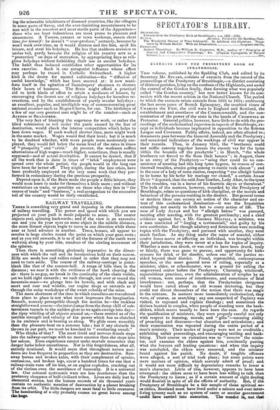RAILWAY TRAVELLING.
THERE is something very grand and imposing in the phmnomena of railway travelling. The power and speed with which you are projected on your path is made palpable to sense. The nearer objects reel, spinning backwards ; and if the view is an extensive one and you fix your eyes on some object in the middle distance, the more distant objects begin to move in one direction while those near at hand advance in another. Trees, houses, all appear to revolve in large circles round the point on which your gaze rests ; and as you roll onwards, it is as if all the fixtures of the earth were waltzing along by your side, emulous of the circling movement of the spheres.
Then there is something gloriously imperative in the direct- ness with which the rail and its locomotives hold on their course. Hills are made low and vallies raised in order that they may not need to turn aside. The course of the railway-carriage is point- blank like that of the cannon-ball. A range of hills rises in the distance; we near it with the swiftness of the hawk cleaving the air: there is no gap, no break in the continuity of the chain visible, yet we hold right onwards ; we rush through, not over or round the mountain-mass—we plunge into its bowels, and with clash and snort and roar and whistle, our engine drags us onwards as if through the noisy workshops of the swart cobolds of the mine.
The mere shortness of the time in which travellers are transferred from place to place is not what most impresses the imagination. Smooth, scarcely perceptible though the motion be—the reckless straightforward course—the interchange from the damp chill of sub- terranean tunnels to the sudden glare as we again emerge into day— the tipsy whirling of all objects around us,—these remind us of the terrible strength and velocity of the power which has us clutched in its embrace and is bearing us along. We glide more smoothly than the pleasure-boat on a summer lake ; but if any obstacle be thrown in our path, we must be knocked to "everlasting smash." Who thinks of that ? The most timid and nervous female steps into the railway-carriage with no more emotion than she steps into /ter saloon. Even experience cannot make mortals remember that danger lurks below smoothness. Nor is this forgetfulness, after all, entirely irrational. It would seem that throughout nature acci- dents are less frequent in proportion as they are destructive. Run- away horses and broken axles, with their complement of sprains, contusions, and broken legs, occur a hundred times for one that a railway-train runs off its bias, or an engine explodes, crushing out of the victims even the semblance of humanity. It is a universal law. Our colossal systematic wars are less murderous than the predatory chuppaoa of half-civilized tribes. Lives are daily lost by elemental storms, but the human records of six thousand years contain no authentic mention of destruction by a planet breaking from its orbit. The little dangers are most fatal to little creatures. The bombarding of a city probably causes no great havoc among the bugs.


























 Previous page
Previous page